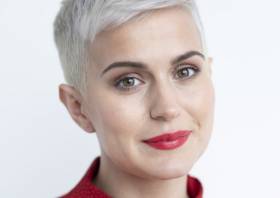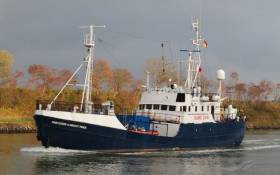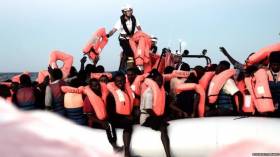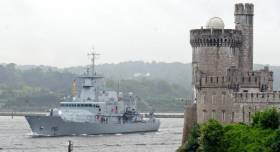Displaying items by tag: Migrant Crisis
Fine Gael MEP Defends Vote Against Measure To Enhance Mediterranean Rescue Missions
Fine Gael MEP Maria Walsh has defended her decision to vote against a resolution in the European Parliament to enhance rescue missions for migrants in the Mediterranean.
The vote in Strasbourg yesterday (Thursday 24 October) lost by two. Every Fine Gael MEP — Walsh, Frances Fitzgerald, Sean Kelly and Mairéad McGuinness — voted against the resolution.
There were also four votes not recorded, from independent Clare Daly, Billy Kelleher (Fianna Fáil), Dianne Dodds (DUP) and Naomi Long (Alliance).
The Fine Gael MEPs have been criticised for their stance against the resolution that called on member states to “step up their efforts” and “enhance proactive search and rescue operations” in the Mediterranean, a signifiant and perilous crossing point for people from Africa and Asia seeking asylum in Europe.
The vote result was applauded in the chamber among the far-right block of European parliamentarians, a response condemned among others by Green Party MEP Grace O’Sullivan who voted for the resolution.
Speaking on behalf of her fellow party MEPs, Walsh said their decision was based on issues with ‘sharing intelligence’.
“We want to save lives and fight human traffickers and to do that, we need a coherent, comprehensive and long-term EU response to search and rescue in the Mediterranean,” she said after the vote.
“In the short-term, the EU and member states must allocate more resources to Search and Rescue and increase missions to save more lives. We also need to urgently step up the fight against the organised criminals and human traffickers who profit on the vulnerable.
“The resolution rejected by the European Parliament today does the opposite by calling for Frontex, the European border and coastguard agency, to share intelligence about its operational activities with every boat in the Mediterranean.
“That would endanger more lives by facilitating, instead of dismantling, the business models of smugglers and human traffickers. We could not support that.”
Walsh, who sits on the European Parliament’s Civil Liberties Committee, said “we can do so much better” than the failed resolution “which plays into hands of people smugglers and lacks workable solutions”.
Update Friday 25 October: this article has been corrected to note that the absent votes of four Irish MEPs were not recorded.
German Ship with 62 Migrants Onboard Allowed to Berth in Malta
A German ship with 62 migrants which had been blocked for ten days from landing in Mediterranean ports has been allowed to berth in Malta writes Lorna Siggins.
As Afloat reported previously, The Alan Kurdi - named after three-year-old Syrian Kurdish refuge Alan Kurdi who was washed ashore on a Turkish beach in September 2015 - had appealed for assistance after Italy and Malta had initially refused it entry.
The ship run by a German charity Sea-Eye is the last remaining migrant rescue vessel deployed by a non-governmental organisation (NGO) in the Mediterranean.
The Alan Kurdi (italics) had reported that it was short of food, water, medicine and other supplies. Two women on board had already been evacuated to Malta for urgent medical reasons.
Italy’s interior minister Matteo Salvini said Germany should take the migrants as they had been rescued on April 3rd off Libya by a German NGO.
The impasse was broken after Migrant Offshore Aid Station (MOAS), a rescue NGO founded by a Malta-based couple with Irish links, intervened to assist the stranded German ship.
French interior minister Christophe Castaner also said on Friday that EU partners would “show solidarity” towards those on board, including 12 women and two young children.
The Alan Kurdi docked in the Maltese harbour of Valletta at the weekend, and Maltese prime minister Joseph Muscat said that Germany, France, Portugal and Luxembourg had agreed to take the migrants.
He said that none of the migrants would remain in Malta, which “cannot shoulder this burden alone”.
Sea Eye criticised the time it had taken to allow the ship to berth and said a compromise must be found.
MOAS was founded in 2014 by millionaire Christopher Catambrone, an American of Irish and Italian descent, and his Italian wife, Regina.
Explaining its decision to intervene last week, MOAS noted that recent escalating violence in Libya only “enhances the need for the creation of safe and legal routes for vulnerable people in desperate need of protection”.
Ireland was recently informed that its involvement in the current EU migrant response operation will change, with the downgrading of Operation Sophia.
The Naval Service ship LE Eithne will not be deployed to the Mediterranean as had been anticipated later this month.
Ireland initially became involved in migrant rescue in 2015 in a bilateral agreement with Italy, and switched to the EU operation, focused more on surveillance and interdiction of people smugglers off Libya, in July 2017.
#MigrantCrisis - BBC News reports a rescue vessel carrying 629 migrants is stranded in the Mediterranean after Italy's new interior minister refused permission for it to dock.
Matteo Salvini, leader of the right-wing League, said Malta should accept the Aquarius but he was rejected.
Malta says the German charity SOS Méditerranée picked up the migrants in Libyan waters, which means they fall under Italy's jurisdiction.
Italy is the main entry for migrants crossing from North Africa to Europe.
The League promised voters during Italy's recent general election that it would take a tough stance on immigration.
- Reality Check: Claims about migrants arriving in Italy
- Desperate migrants rescued from the sea
- UN sanctions for people traffickers in Libya
SOS Méditerranée, which runs the Aquarius, said the ship had been instructed by the Italian Maritime Rescue Coordination Centre to stand by in its current position, 35 nautical miles from Italy and 27 nautical miles from Malta.
For more on this story click here.
Currently operating in the Mediterranean as previously reported on Afloat is the Irish Naval Service OPV90 class L.É. Samuel Beckett. The crew recently received in Malta medals in recognition of their Operation Sophia work since deployment in April.
OPV LÉ Samuel Beckett Departs On Mission to Counter Human-Trafficking in Mediterranean
#Navy - Leadship of the Irish Naval Service OPV90 class, LÉ Samuel Beckett is departing today for the Mediterranean to take part in 'Operation Sophia'.
As The Irish Examiner reports, Ireland first joined the EU naval operation against smugglers and traffickers last October when another Offshore Patrol Vessel, the OPV80 class LÉ Niamh was deployed for a three-month mission.
Minister with Responsibility for Defence Paul Kehoe says the crew will be helping to address some of the root causes of migration and human trafficking.
For more click this link.
Migrant Crisis: Irish Navy's LÉ Niamh Rescues Hundreds Off Libyan Coast
#MedRescue - Irish Naval Service personnel came to the rescue of around 380 migrants across three operations in the Mediterranean on Friday (18 September), as the Irish Examiner reports.
The responses off the Libyan coast – which included the rescue of 124 and 127 people respectively from inflatable craft, and saving 129 from a sinking dinghy – bring the LÉ Niamh's total rescued to 3,723.
That tops the number saved by sister ship the LÉ Eithne, which returned from its nine-week deployment in July.
































































